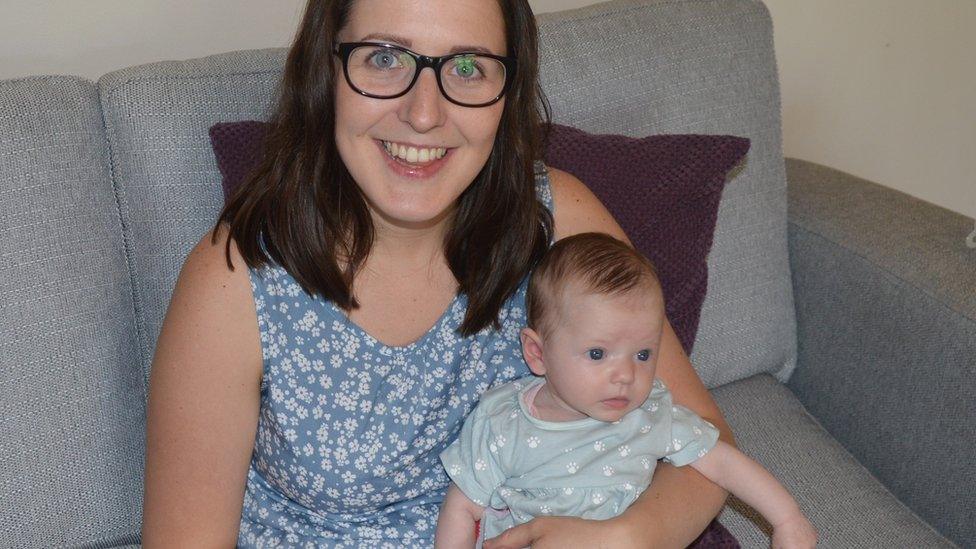Parents 'missing out on new baby health visits'
- Published

Kirsty had panic attacks while she was pregnant with her daughter Molly
About one in four new parents in England is not seeing a health visitor when their baby turns one, increasing the risk of mental health problems going unnoticed, the NSPCC says.
The government has promised five home visits for every family - from pregnancy until the age of two.
But cuts to local authority budgets and fewer health visitors were having an impact, the charity said.
Scotland provides 11 health visits and Wales nine.
Health visitors work with parents who have new babies, offering support and advice from pregnancy until the child starts school at the age of five.
Health officials in England said they would continue to encourage uptake of the five child health and development reviews "so that parents and children benefit from this vital support".
'There's not much focus on mums'
Kirsty Harvey, from York, gave birth to her daughter Molly 10 weeks ago.
She asked for support during her pregnancy when she began to have panic attacks - but she didn't see a health visitor until after the birth.
"I saw six different midwives before and after the birth and it's difficult explaining your worries again and again to six different people," she says.
"There's not much focus on you as a mum.
"If they asked, my immediate response was just to say, 'Yeah, yeah, I'm fine.'"
Seeing the same person, who knew she'd suffered with anxiety before, would have made a difference, Kirsty says.
"It's really hard to make that phone call if you're struggling," she says.
"You need someone to check up on you."
In England, the five health checks on babies and families are:
antenatal health visit
new baby review
six- to eight-week assessment
one-year assessment
two- to 2.5-year review
Preliminary figures, , show 77% of children received a 12-month review by the age of one. This compared with 75% for the previous year.
And a Freedom of Information request by the NSPCC, completed by 32 out of 149 local authorities, suggests 38% of families are not receiving a visit from a health visitor before the baby is born.
says one in five mums and one in 10 dads experiences mental health problems during pregnancy and after birth.
Alana Ryan, senior policy and public affairs officer at the NSPCC, said health visitors were well placed to spot the signs of mental health difficulties, so that babies and their parents get the help they need to bond in the early days.
But she said health visitors' workloads were rising because one in four had gone, due to funding cuts.
In 2015, local authorities became responsible for paying for health visiting services, instead of the NHS.
'It takes skill'
Dr Cheryll Adams, executive director of the Institute of Health Visiting, said mums wanted to see the same health visitor, who is always a trained nurse or midwife, throughout.
That way, safeguarding issues and other problems can be prevented and health needs supported, she said.
"If you're not known to them, they're not going to open up.
"It takes skill to get behind what a mum is telling you."
Prof Viv Bennett, chief nurse at Public Health England, said health visitors played a vital role in supporting parents and giving children the best start in life.
"The five child health and development reviews are an important part of the offer and PHE will continue to work nationally and locally to support uptake and improve outcomes, so that parents and children benefit from this vital support."